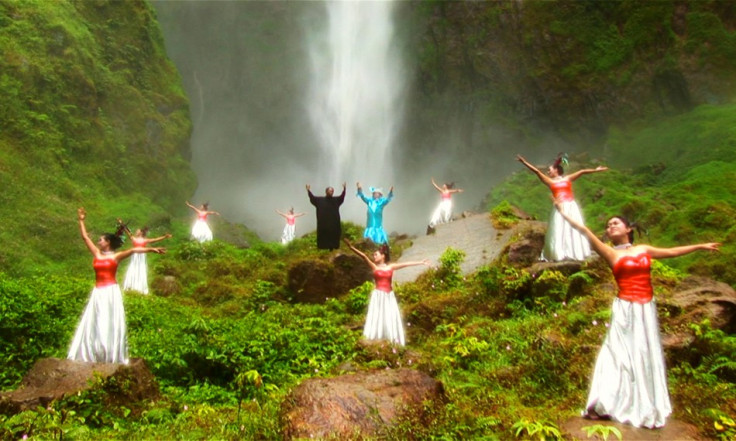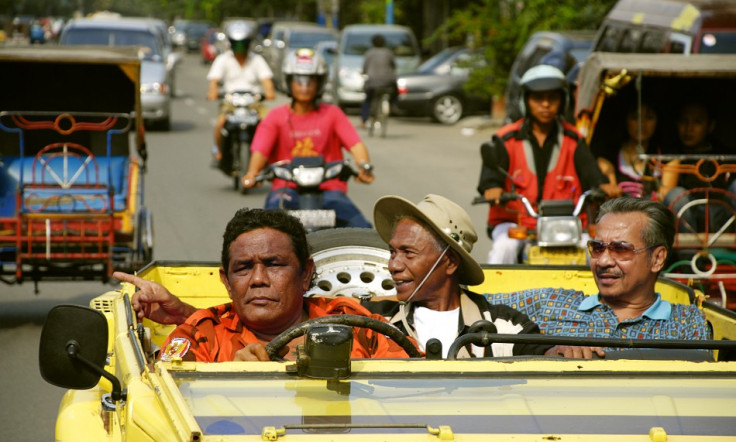Joshua Oppenheimer's Act of Killing Exposes Indonesia's Shame
Surreal documentary The Act of Killing asks mass murderers to recreate their crimes for the camera in whatever film style they choose

In Indonesia in 1965 a failed military coup prompted the slaughter of more than one million alleged communists - an event that until very recently was still celebrated by people throughout the archipelago.
That was until The Act of Killing was released. An astonishing documentary that we regard as daring and imaginative filmmaking of the highest order, the movie sheds light on the slaughter by having the perpetrators of the crimes re-create the killings for the camera in any style they choose - be it film noir, a western, or an Elvis Presley musical.
The film's American director Joshua Oppenheimer, tells IBTimes UK why he found it important to make a film on the killings.
"The Western world at the time had celebrated the killings as something good, as a victory over communism, and as a result of that they've never had to admit that what they've done is wrong. On the contrary they've mythologised the mass killings as something heroic, and they've built a whole regime of impunity and fear on the basis of that," he said.
"The film is an exposé of what happens when we as human beings build normality on terror and lies, and about how we tell stories to justify our actions and how we as human beings commit evil and the effects of evil on ourselves and on our societies."
Finding Anwar
Oppenheimer started by interviewing and speaking with survivors of the killings before turning the camera instead on to the perpetrators. After working his way piece by piece up the chain of command he met 72-year-old Anwar Congo, a once small-time gangster who made his name through orchestrating the deaths of at least 1,000 people. The director notes that he chose to make Anwar the centrepiece of the film as he immediately sensed the hidden trauma he held over his actions.
"Anwar was the 41st killer we filmed and he was special because his pain was close to the surface. I think I lingered on Anwar because somehow I sensed that there was something very profound at work there. I'm glad I did because in the end we see a man who has maybe escaped justice, but has not escaped punishment, he's really distraught by what he's done," he said.
It might not seem that way at first. Boasting of his killings to the camera, he re-enacts the mass murders through various Hollywood genres, as he says he wants to create something full of action that people will find entertaining. That is, until he looks back on the footage himself.
"One of the methods I had was to screen the footage back to people to see if they would recognise themselves. Anwar looked particularly disturbed watching himself," he said.
"Yet he doesn't dare say why he's so disturbed because to do so would be to say he's wrong. No-one's ever made him say that, and indeed all the propaganda, all the justification, even all the boasting, is probably a defensive effort to insist that it was right, in part so that he can live with himself."

Cultural vacuum
The film focuses not just on Congo, but the current regime in Indonesia where the events of 1965 are celebrated and the gangsters who committed the acts idolised. Other than through the perpetrators' discussing the past, very little time is spent detailing what led up to the events and why they occurred. Oppenheimer says that he deliberately avoided making too many historical references in the film in order to focus on the impact the events half a century ago still have on contemporary Indonesia.
"I have a very simple historical story, and the reason for that is that if you go in to great detail historically you create a historical primer, and you end up with a historical film. It was very important to me that this be a film about today, about now, about what are these men boasting about in the presented, about the moral and cultural vacuum that is created," he said.
This vacuum comes from a country where people are told that the killings were good because communism was sadistic and evil. By focusing on Anwar's reimaginings of the killings over objective historical accounts, Oppenheimer argues that what we see is an emotional history that reveals more about how people try to recover from and justify committing such atrocities.
"I was very aware that it was a film about how we tell stories, all of us, to distance ourselves, to escape from the most painful parts of reality, and mainly we do that to justify our actions," he said.
Impact on Indonesia
The film has already received numerous awards and critical praise upon being shown across the US and Europe, but it is Indonesia itself where it has had the greatest impact. Numerous secret and underground screenings have prompted frenzied discussion in the country, and Anwar has found himself an overnight celebrity. Oppenheimer admits being pleasantly surprised at how he has managed to spark up a debate over the violent actions of the past
"I thought that the film would be dismissed as the work of a foreigner who was creating a bad image of Indonesia. But the film has been embraced by Indonesians in a way that I never expected," he said.
Because of Oppenheimer's extraordinary film, the forgotten story of Indonesia's killing fields is finally out in the open again. The Act of Killing casts light on a dark moment in 20<sup>th century history, and brings to the surface the painful memories and lingering scars left behind on Indonesian society.
READ:
© Copyright IBTimes 2025. All rights reserved.






















